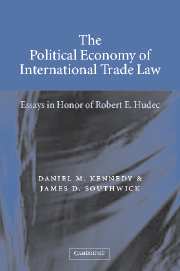Book contents
- Frontmatter
- Contents
- List of contributors
- Preface
- Foreword by E. THOMAS SULLIVAN
- Introduction: An overview of the volume
- Part I The constitutional developments of international trade law
- Part II The scope of international trade law: Adding new subjects and restructuring old ones
- Part III Legal relations between developed and developing countries
- Part IV The operation of the WTO dispute settlement procedure
- 15 Testing international trade law: Empirical studies of GATT/WTO dispute settlement
- 16 The Appellate Body and its contribution to WTO dispute settlement
- 17 A permanent panel body for WTO dispute settlement: Desirable or practical?
- Comment: Step by step to an international trade court
- 18 International trade policy and domestic food safety regulation: The case for substantial deference by the WTO Dispute Settlement Body under the SPS Agreement
- Comment: The case against clarity
- 19 Judicial supremacy, judicial restraint, and the issue of consistency of preferential trade agreements with the WTO: The apple in the picture
- 20 Should the teeth be pulled? An analysis of WTO sanctions
- 21 Problems with the compliance structure of the WTO dispute resolution process
- 22 “Inducing compliance” in WTO dispute settlement
- Bibliography of works by ROBERT E. HUDEC
- Index
19 - Judicial supremacy, judicial restraint, and the issue of consistency of preferential trade agreements with the WTO: The apple in the picture
Published online by Cambridge University Press: 02 September 2009
- Frontmatter
- Contents
- List of contributors
- Preface
- Foreword by E. THOMAS SULLIVAN
- Introduction: An overview of the volume
- Part I The constitutional developments of international trade law
- Part II The scope of international trade law: Adding new subjects and restructuring old ones
- Part III Legal relations between developed and developing countries
- Part IV The operation of the WTO dispute settlement procedure
- 15 Testing international trade law: Empirical studies of GATT/WTO dispute settlement
- 16 The Appellate Body and its contribution to WTO dispute settlement
- 17 A permanent panel body for WTO dispute settlement: Desirable or practical?
- Comment: Step by step to an international trade court
- 18 International trade policy and domestic food safety regulation: The case for substantial deference by the WTO Dispute Settlement Body under the SPS Agreement
- Comment: The case against clarity
- 19 Judicial supremacy, judicial restraint, and the issue of consistency of preferential trade agreements with the WTO: The apple in the picture
- 20 Should the teeth be pulled? An analysis of WTO sanctions
- 21 Problems with the compliance structure of the WTO dispute resolution process
- 22 “Inducing compliance” in WTO dispute settlement
- Bibliography of works by ROBERT E. HUDEC
- Index
Summary
The issue
The panel report on Turkey – Restrictions on Imports of Textile and Clothing Products confronted the issue of judicial review of preferential trade agreements (PTAs). The facts, in a nutshell, could be described as following: Turkey, following the conclusion of its customs union with the European Community (EC), raised its protection for textile products. India complained that the Turkish measures at hand were inconsistent with Turkey's obligations under the World Trade Organization (WTO).
Both parties to the dispute argued explicitly (¶9.45) that the Panel should not assess the compatibility of the Turkey–EC customs union with the provisions of Article XXIV General Agreement on Tariffs and Trade (GATT). Things got awry, though, when Turkey added in its second submission that the Panel could not assess the WTO compatibility of any specific measure adopted in the context of the formation of a PTA separately and in isolation from an assessment of the overall compatibility of this PTA with Article XXIV GATT. Hence, Turkey was de facto arguing that invocation of Article XXIV GATT is tantamount to a waiver from GATT obligations.
India disagreed and urged the Panel to pronounce on the issue. The Panel rejected Turkey's argument. It did not go the “full nine yards” though. In a carefully drafted passage (¶9.56), the Panel rejects the view that it has to assess the overall compatibility of the PTA in order to reach judgment on the compatibility of the specific Turkish measures at hand with the WTO.
- Type
- Chapter
- Information
- The Political Economy of International Trade LawEssays in Honor of Robert E. Hudec, pp. 583 - 601Publisher: Cambridge University PressPrint publication year: 2002
- 20
- Cited by



